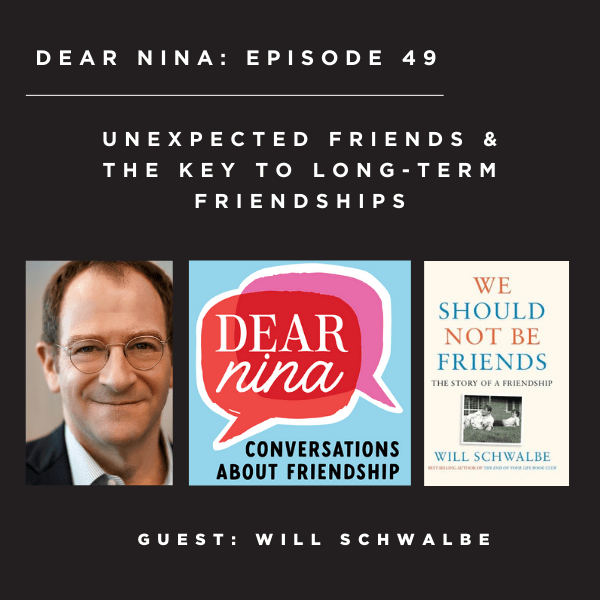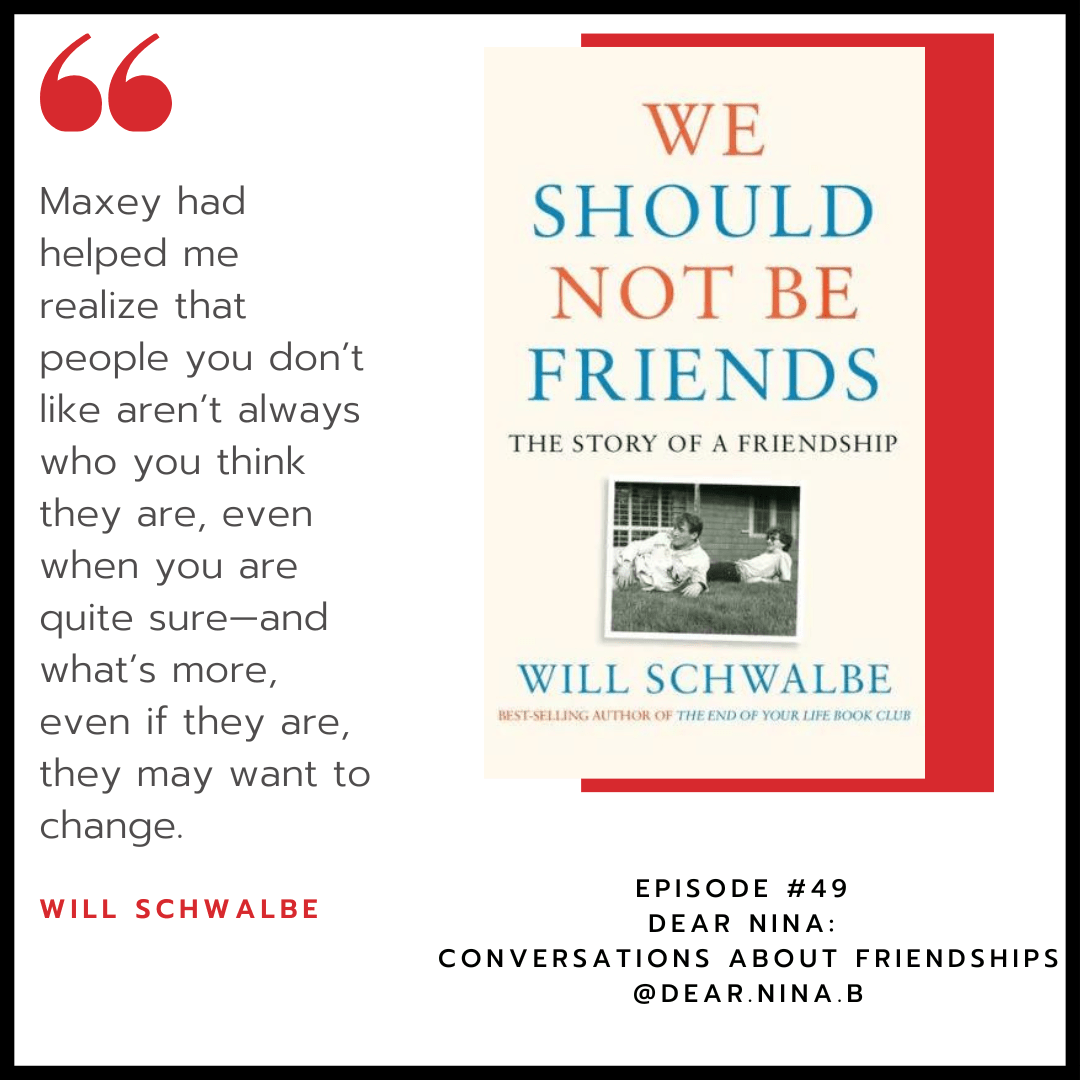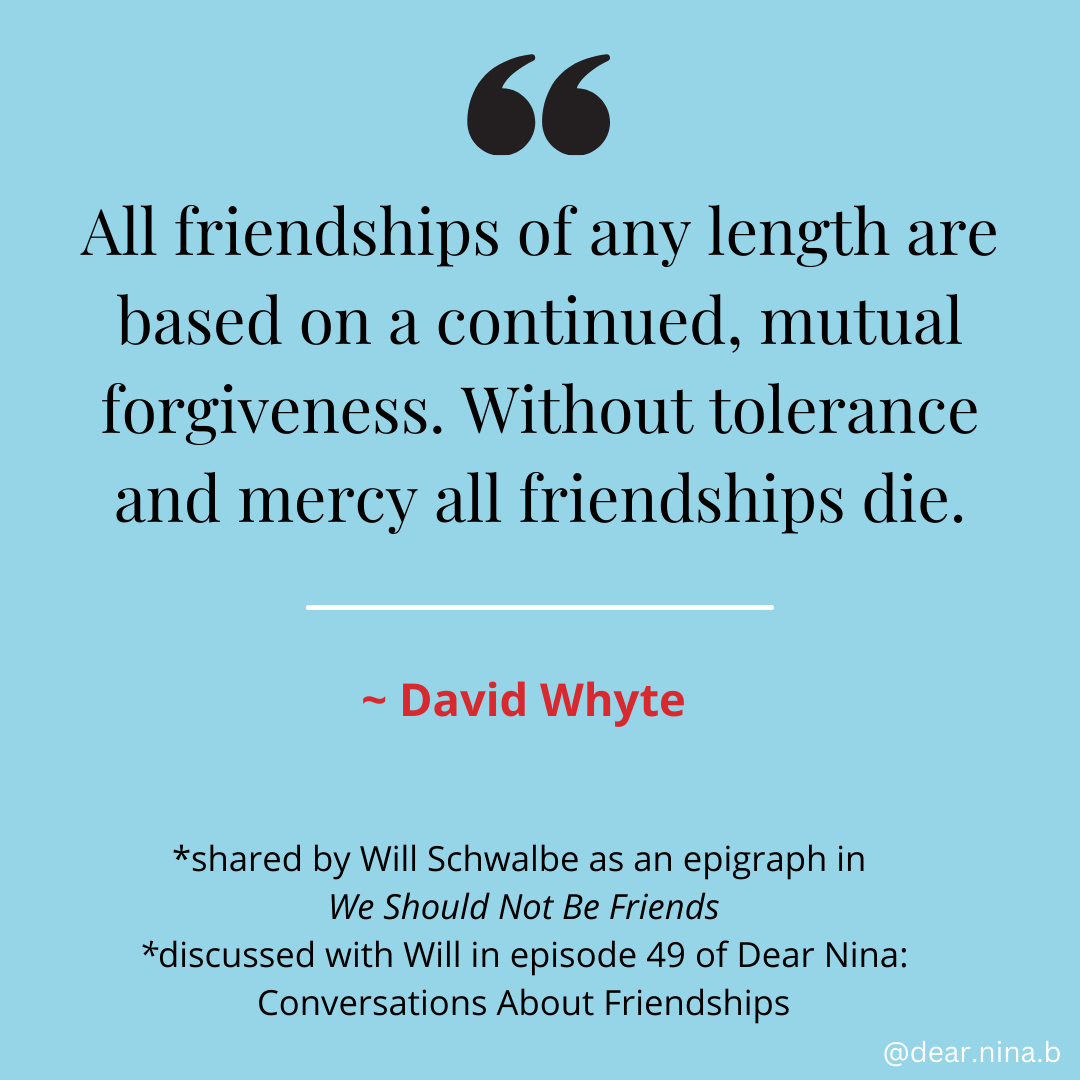It’s better to say something than nothing. Make the hard phone call. Donate to the cause. Let friends help you. Ask questions. Look past what you think you know about people. Assume the best. These are keys to long-term friendship I discussed with Will Schwalbe, author of We Should Not Be Friends: The Story of a Friendship.
The first part of episode 49 is a natural continuation of last week’s episode about the benefit of having friends with different points of view and backgrounds. I inadvertently made a series! And in the second half, Will and I talked about the real work of maintaining a decades long, sometimes challenging friendship and why we should bother.
We Should Not Be Friends: The Story of a Friendship will challenge your assumptions about friendship. Two of Will’s previous books include Books for Living and The End of Your Life Book Club, which I know many people out there have loved. Will has worked in book publishing (currently as an editor at Macmillan); in digital media; and as a journalist, writing for various publications, including The New York Times and the South China Morning Post. He lives in New York.
FIND EPISODE #49 ON APPLE PODCASTS, SPOTIFY, OR ANYWHERE YOU LISTEN TO PODCASTS!
Signup for my newsletter on friendship, books, TV, and more.
Highlights from my conversation with Will Schwalbe
First, a summary of We Should Not Be Friends: The Story of a Friendship
By the time Will Schwalbe was a junior at college, he had already met everyone he cared to know: the theater people, writers, visual artists and comp lit majors, and various other quirky characters including the handful of students who shared his own major, Latin and Greek. He also knew exactly who he wanted to avoid: the jocks. The jocks wore baseball caps and moved in packs, filling boisterous tables in the dining hall, and on the whole seemed to be another species entirely, one Will might encounter only at his own peril.
All this changed dramatically when Will collided with Chris Maxey, known to just about everyone as Maxey. Maxey was physically imposing, loud, and a star wrestler who was determined to become a Navy SEAL (where he would later serve for six years). Thanks to the strangely liberating circumstances of a little-known secret society at Yale, the two forged a bond that would become a mainstay of each other’s lives as they repeatedly lost and found each other and themselves in the years after graduation.
From New Haven to New York City, from Hong Kong and Panama to a remarkable school on an island in the Bahamas—through marriages and a divorce, triumphs and devastating losses—We Should Not Be Friends tracks an extraordinary friendship over decades of challenge and change. Schwalbe’s marvelous new work is, at its heart, a joyful testament to the miracle of human connection—and how if we can just get past our preconceptions, we may find some of our greatest friends.
Some of the keys in Will’s story to a successful long-term friendship:
It’s better to say something than nothing.
Make the hard phone call.
Donate to the cause.
Let friends help you.
Ask questions.
Look past what you think you know about people.
Assume the best.
Will and I also spoke about:
- our commonality not loving hugs
- the double meaning I saw in the title (We should not be friends because we’re so different. We should not be friends because we’re struggling to stay in touch, or we’re perceiving slights where they don’t exist.)
- the historical backdrop of Will’s time at Yale as an out gay student in the early 80s
- the reasons he initially could not imagine being friends with a star athlete, Navy-seal headed, student like Maxey
- how the secret society that fostered Will’s friendship with Maxey was ahead of its time in making sure each student was different
- the difficulty of replicating something like the secret society or even something like The Breakfast Club that brought together different people and forces a breaking of barriers
- how ritual and a physical space fostered these friendships and make unexpected friendships more likely to succeed
- a quote from the book I loved: “Maxey had helped me realize that people you don’t like aren’t always who you think they are, even when you are quite sure—and what’s more, even if they are, they may want to change.” (148)
- Will: “I realized I was probably wrong about this guy, and we had a lot of bumps. We disappointed each other that year and many times since. But the overriding sense I got was that we shared the same values. And one of the things that’s most important to me in this book is I really don’t think we can be friends with everybody. I just don’t think that’s the case, and I know you’ve thought deeply about friendship and talked to many people about it, and I think the kind of kumbaya we can all be friends is not true, but I do think we can be friends with far greater swath of people than we might imagine. And that sentence that you read, I’m so happy you read that because Maxey, one of the things I love most and admire about him most—he not only wants to be good and not only is a profoundly good person, but he always wants to be better.”
- sharing values as being more about how people treat others and less about who they vote for
- Will: “People have asked me, I’ve been on a tour, various cities talking about the book, and when we get on the subject of friendship and values, people have said, how do you know someone shares your values? And for me, the biggest sign is how they treat other people, not how they treat me, not how they treat their friends even, but how they treat strangers whose paths they cross during the normal course of life. And I think that often tells almost everything you need to know about someone.”
- the vulnerability it takes to be friends with someone who seems to have the potential to not understand you
- the real work it takes, without a secret society of “breakfast club” to meet people who are different from you
- the years that would be between times Will and Maxey spent time together and the emotional work it takes to not take things personally and give the benefit of the doubt
- the importance of connectors in friendships who can keep several friends in touch or push us to stay in touch
- Another favorite quote of mine from the book: “I briefly wondered if he was mad about my not sending a check. Or about my not being in touch with him. Or both. Even though I hadn’t called or written him, I couldn’t help feeling a bit hurt. Wasn’t it the responsibility of the person coming to town to call the person who lived there? Wasn’t that just one of those unwritten rules of friendship?”
- Will shared the quote he chose for the book’s epigraph by British poet, David Whyte: “All friendships of any length are based on a continued mutual forgiveness. Without tolerance and mercy, all friendships die.”
- the problem of unwritten rules in friendships
- the joy of hearing from old friends
- Maxey’s success in bringing some of the best pieces of the secret society to The Island School
A few favorite quotes from the book:
“Neither of us ascribed any meaning to the fact that we had only recently reconnected. During the years after college, we hadn’t not talked; we just hadn’t talked.”
“I briefly wondered if he was mad about my not sending a check. Or about my not being in touch with him. Or both. Even though I hadn’t called or written him, I couldn’t help feeling a bit hurt. Wasn’t it the responsibility of the person coming to town to call the person who lived there? Wasn’t that just one of those unwritten rules of friendship?”
“The power of our experience senior year was that we all had to see each other twice a week. Now that we spoke far less frequently, it was easy for paranoia and doubt to enter our friendships. I realized that I needed to take a a breath before I decided that Maxey or any other friend had dropped me—a suspicion that in the past had sometimes led me to dropping that friend so I wouldn’t get hurt. And that I also needed to be more aware of friends who might be feeling that I’d dropped them.”
Author photo credit: Michael Maren
* Book links are affiliate links
Let’s connect!
- Here’s my Substack newsletter about friendship & more
- JOIN the Dear Nina Facebook group
- Ask an anonymous question
If you like what you’re hearing, please tell a friend!
Also, if you can rate and/or leave a review on Apple Podcasts, I’d be so grateful.
Latest posts by Nina Badzin (see all)
- 5 Friendship Issues to Consider Addressing with a Therapist - April 17, 2024
- Subtle Friendship Slights and Changing Your Instagram Handle - April 10, 2024
- The Courage to Trust Friends After You’ve Been Hurt - April 2, 2024
- Why Big Friend Groups Often Fail: Dr. Lisa Damour - March 25, 2024




